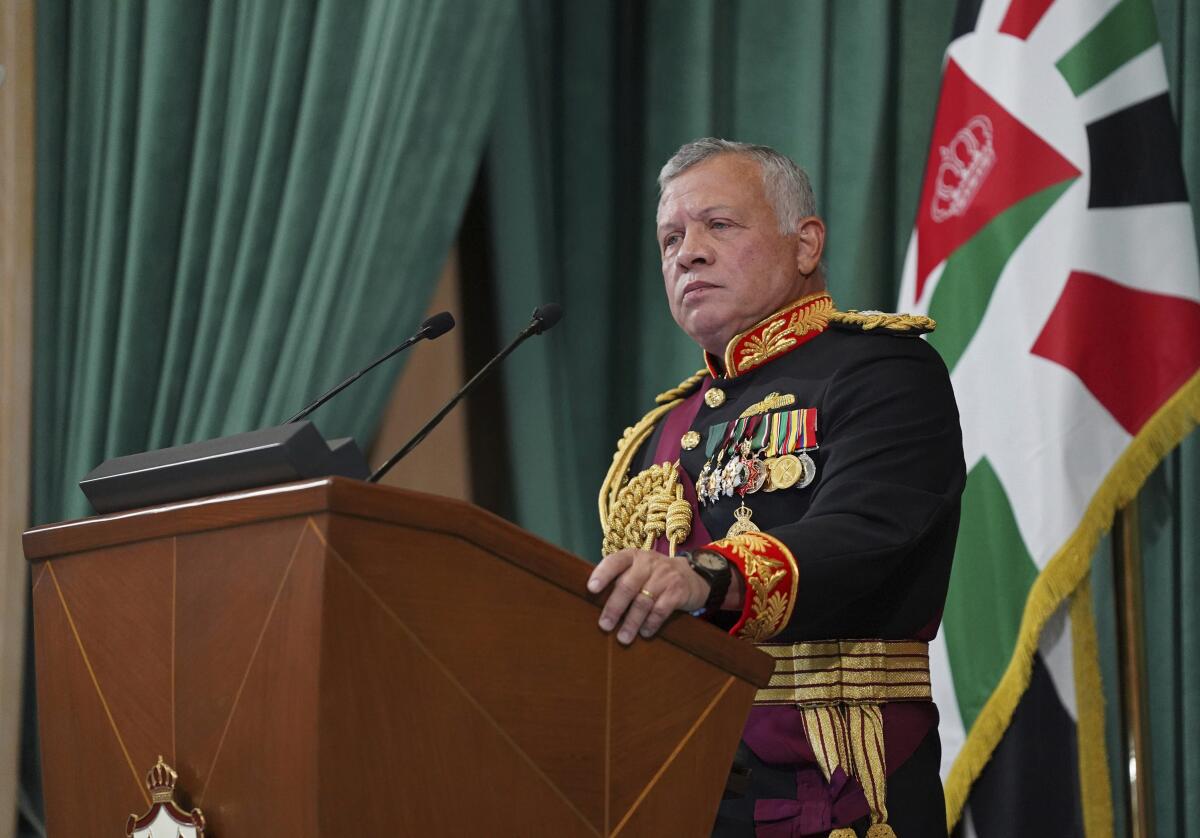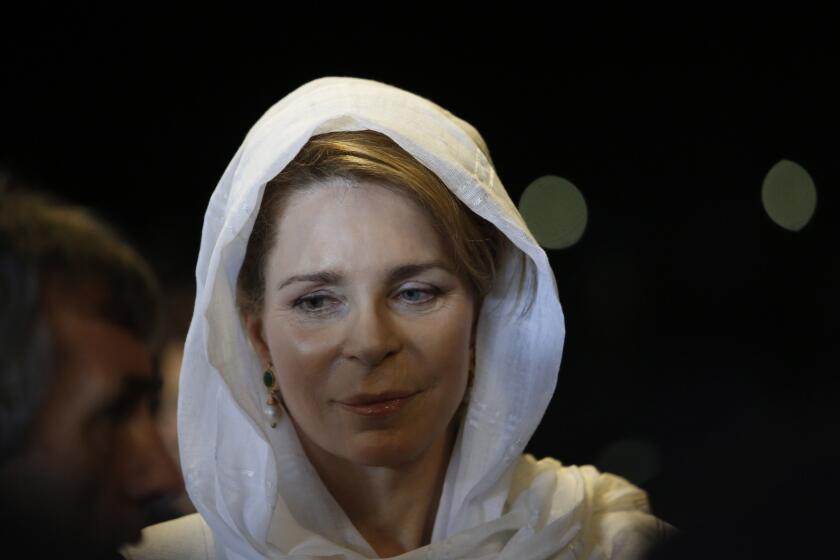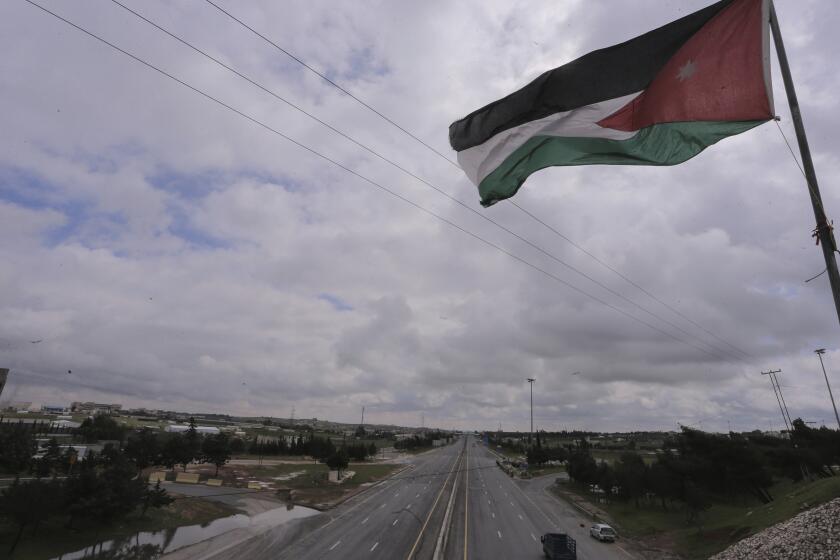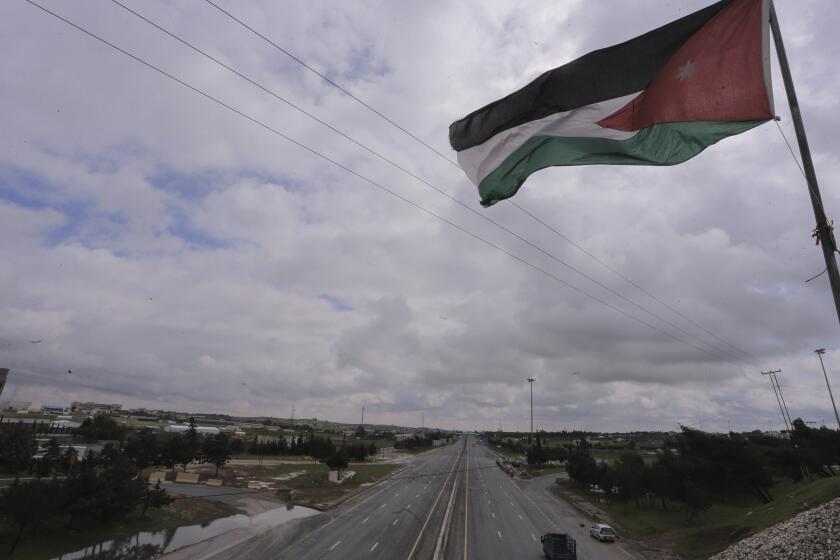Jordan’s powerful tribes on collision course with monarchy over alleged royal plot

- Share via
AMMAN, Jordan — It all began with cake. Sakher Fayez, a Jordanian activist, was celebrating his birthday with friends and relatives April 3 at his family’s apartment building in Amman’s upscale Khaldah district.
Around 4 p.m., a deliveryman came by with a cake no one had ordered. When Fayez’s 16-year-old son opened the door, more than a dozen masked gunmen — dressed in black and bristling with machine guns — burst in, grabbing everyone in their path as they fanned out through the house.
“I can’t describe the screaming, the women and kids shouting. They pushed us into the bedroom as they searched the house. They got our passports, took our mobiles,” said Sahar, Fayez’s sister.
“They cornered my nephew and threatened to shoot him when he tried to run away. This isn’t the sort of thing we’re used to in Jordan.”
The assault on Fayez’s house was part of a synchronized government operation, with teams blitzing across different parts of the kingdom in blacked-out SUVs to capture some 18 associates of Prince Hamzah, who officials said were all part of a foreign-backed plot to “destabilize Jordan’s security and stability.”
One strike force overran the home of Yasser Majali, the former crown prince’s head of office, near the city of Karak, about 55 miles south of Amman. As with Fayez, the gunmen handcuffed and manhandled Majali into a car in front of horrified family members. A relative, Samir Majali, was out shopping on the area’s main thoroughfare when four vehicles surrounded his car.
Who is Queen Noor? Royal drama emerges, nearly 43 years after an American’s marriage to Jordan’s King Hussein.
“Someone called me from the market, told me Samir had been taken and his car was in the middle of the street,” said Mohammad Majali, Samir’s brother. “They didn’t even let him park.”
As the names of some those captured seeped out — many are still unknown — Jordanians were shocked. Most of those arrested hailed from the country’s so-called East Bank tribes, the powerful clans that for decades had been the monarchy’s sword and shield, its soldiers and statesmen. East Bankers consider themselves the country’s Indigenous inhabitants, rather than the Jordanians of Palestinian origin who came from areas west of the Jordan River.
The arrests, officials say, were the result of a year-long surveillance operation by the army, police and intelligence service. In their telling, they struck just before the zero hour, averting a wave of chaos and discontent that Prince Hamzah hoped to unleash and ride into the palace to replace his half brother, King Abdullah II.
But more than a week after the raids, the government has released no details of the purported sedition. A gag order on the media, leaked recordings of Hamzah’s fightback against the officials who came to confront him and his near-disappearance from public view have fueled widespread skepticism of the official palace line.
The palace insists that Jordan’s royal house and the country are in order after the detention of Prince Hamzah. Many are skeptical.
The government insists the plot has been “contained,” with King Abdullah and other royal family members displaying a united front Sunday during Jordan’s centennial celebration. That included the only appearance so far by Hamzah, who had acquiesced to mediation of the crisis by an uncle to both himself and Abdullah and issued a declaration of loyalty to his half brother.
As days pass with no word of their kinsmen and scant information on why they were taken, the tribes now find themselves on a collision course with the monarchy they have always supported.
“For the government to kidnap them, and we don’t know if they’re inside or outside the country … we have legal avenues, but if we expend them, of course we’re going to escalate,” said Nasser Majali, one of Yasser’s brothers. “We won’t abandon our sons. Matters will go on a trajectory we do not want, and you know what escalation means.”
The families of the detained have amassed significant legal firepower, enlisting some 85 lawyers in the country as well as consulting with rights organizations abroad.

But the arrests have reverberated beyond the tribes, stirring alarm among legal groups and activists who say they form a worrying precedent at odds with Jordan’s usual image as a kingdom on the path to democracy, headed by a much-loved, benevolent ruler.
“Normally, if someone is detained you know where they are and they’re allowed to meet with their lawyers. Authorities have always respected this,” said Alaa Din Armouti, who heads Jordan’s National Center for Human Rights. “Other countries in the region don’t have the high legal standards we do. This is new for us here.”
Jordan, a boot-shaped puzzle piece of mostly desert land wedged between Syria, Iraq, Saudi Arabia, Israel and the Palestinian territories, has long relied on Western powers’ largesse to support its more than 10 million people. Washington, which counts King Abdullah as a top regional ally, gave Jordan a $6-billion aid package in 2018 to be disbursed over five years.
So far, there has been no lack of diplomatic support for Abdullah amid the shocking royal rupture. But the crisis has nevertheless shaken faith in the country’s institutions, critics say.
Jordan’s king has addressed the public feud with half brother Prince Hamzah, calling it an attempted ‘sedition’ that caused him shock, anger and pain.
That faith took another hit Monday, when Prime Minister Bisher al-Khasawneh said the accused would have their cases referred to the public prosecutor as part of a state security trial — except for Prince Hamzah, who, according to the king’s edict, would be dealt with “within the framework” of the ruling Hashemite family.
That has only added to tribal and popular anger.
“The Jordanian constitution is clear. Only the king is immune from legal examination — no one else,” said Mohammad Abdul Majid Majali, a member of the tribe and head of its legal team. “If there’s a trial, then it should be applied to everyone.”
The apparent feud between Prince Hamzah and his half brother is emblematic of what the tribes say is the erosion of their role during the current king’s reign. Abdullah took power in 1999 and, five years later, named his own son as crown prince, taking away the title that had been bestowed on Hamzah by their father, the beloved King Hussein.
Start your day right
Sign up for Essential California for the L.A. Times biggest news, features and recommendations in your inbox six days a week.
You may occasionally receive promotional content from the Los Angeles Times.
The tribes’ crucial role in the kingdom began during World War I when the Hashemites, along with Lawrence of Arabia, cajoled the tribes to rebel against their Ottoman overseers. In 1921, the British created Jordan (then called Transjordan) with the Hashemites as its rulers. The tribes’ continued loyalty earned them a privileged status within the state, including access to jobs and special assistance.
King Hussein continued that tradition, maintaining close ties with the hitherto-nomadic tribes in the kingdom and relying on them as the state’s guardians.
“In the time of King Hussein, the tribes were respected,” said Nasser Majali. “In this current regime, not at all. He oppresses everyone.”
Nasser Majali complained of exclusion of the tribes from positions of power, unequal distribution in official appointments and the cancellation of many of the perks the tribes had enjoyed in the past. Instead, the government is now staffed with what he and others derisively call “the digital crowd,” a reference to the technocratically minded officials whom Abdullah has championed, and who spearheaded economic liberalization policies that have left many Jordanians feeling poorer.
The savage death of a Jordanian woman at the hands of her father over a perceived impropriety has ignited fresh debate over violence against women.
Hamzah, with a voice and visage strikingly similar to his father’s, had maintained close ties to the tribes, happily conducting regular visits in which he would sip tea with tribal elders and revel in the minutiae of their desert-inspired traditions. That relationship appears to have irked Abdullah, whose foreign upbringing and marriage to a Palestinian wife had done little to endear him to Jordan’s East Banker elite.
Publicly, the tribes insist that they remain loyal to the Hashemites, and that they would readily accept for their family members to be investigated, tried and imprisoned if proven guilty — as long as due process is given.
“Our problem is the government’s violation of the law, entering into people’s homes and treating them like criminals. Then you want to try people with one law and the ruling family with another?” said Hisham Majali, a clan member and one of the organizers of his relatives’ legal defense.
“And it’s strange they would do this around the country’s centennial. With this move, they’ve taken us 100 years back.”
More to Read
Sign up for Essential California
The most important California stories and recommendations in your inbox every morning.
You may occasionally receive promotional content from the Los Angeles Times.














